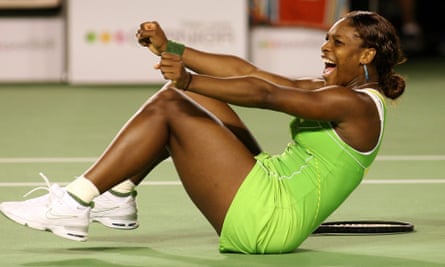Ten years ago this week, Serena Williams arrived at Melbourne Park a faded champion on the brink of irrelevance, a silhouette of the player who had won seven grand slams from 1999 to 2005. The 25-year-old from Compton had played only 15 events in 26 months, dogged by injuries and distractions and a depression brought on in no small part by the murder of her half-sister, Yetunde Price, only a mile from the public courts where a young Serena first picked up a racket. She had gone more than two years since playing in a final as her ranking sank to No136 in the world. The abyss was staring back.
Behold the withering assessment of former Wimbledon champion Pat Cash that ran in the Times of London on the eve of the tournament, since taken down from the newspaper’s website but thankfully preserved in a cached version as a monument to the folly of man. The 742-word obituary, published under the headline “Williams is lost cause”, dismissed Serena as a player with “a limited attention span”, lacking the “fortitude” and “application” to return to the top. The sport had moved on in her absence, he assured, with proof positive in the emergence of Maria Sharapova, Amelie Mauresmo, Jelena Jankovic, Nicole Vaidisova and Ana Ivanovic. “They are the new winning breed,” it reads. “They are tall and hit the ball just as hard as the Williams sisters, if not harder.”
Serena must not be a subscriber. She entered unseeded and played herself into shape and confidence over the fortnight as her rivals fell by the wayside, showing flashes of her vintage brinksmanship in fightback wins over Nadia Petrova and Shahar Peer. Twelve days after touching down in Melbourne, the world No81 had navigated her way to the final.
When pressed to pick the one match from the more than 900 played in Williams’ 23-year career that embodies the devastating power and grit to play her finest in the biggest moments, my thoughts turn to that 2007 final against Sharapova. The Russian teenager had become one of the most famous athletes on the the planet since her breakthrough victory over Williams in the 2004 Wimbledon final. If that match had been pitched as a changing of the guard by a press corps bored with Serena’s monotonous dominance and ever eager to baptize the Next Big Thing, then the 2007 final in Melbourne offered Sharapova, who had already clinched the No1 ranking during the fortnight, an opportunity to rip the baton from Serena’s grasp for good. It would be the last time the pair met on equal psychic footing.

Williams pounded her thunderbolt serve with bad intentions and crushed groundstrokes into the corners with a pace and accuracy that left Sharapova visibly shaken and resigned to defeat before she’d even found a foothold. The American crushed 28 winners against 11 unforced errors and broke Sharapova in four of her seven service games. It was over in a scant 63 minutes, somehow not even as close as the 6-1, 6-2 scoreline would suggest, making Williams the lowest ranked player to win a grand slam in nearly three decades. “It’s always like, tell me no and I’ll show you that I can do it,” Williams said afterward. “I get the greatest satisfaction just holding up the grand slam trophy and proving everyone wrong.”
One decade and a preposterous 14 grand slam titles later, Williams’ greatness is beyond assail, her impact only beginning with her accomplishments between the lines. She’s persevered through racism, family tragedy, injuries and illness to dominate three separate eras of challengers and rewrite the history books of a sport predominantly owned, played and watched by affluent white people. And what of the “new winning breed”? The disgraced Sharapova is winless in her last 18 matches against Williams, a run that extends back 13 years. Ivanovic, with a lifetime record of 1-9 against Williams, retired in December, not long after Vaidisova (0-4) abandoned her last comeback bid. Mauresmo (2-10) is long gone, while Jankovic (4-10) soldiers on with the unenviable title of best active player to have never won a major. Serena has outlasted them all.
Now Williams, the world’s second best tennis player according to the WTA’s computer, will look to prove the doubters wrong once more. She enters this year’s season-opening grand slam coming off a season that saw her surrender the No1 ranking despite winning a seventh Wimbledon title, usurped by a late-blooming German named Angelique Kerber, who stared down Williams in last year’s Australian Open final before doubling down with a US Open win.
Time is the most unrelenting opponent for any athlete and there’s no reason to believe Williams, now closer to 40 than 30, has fully overcome the shoulder and knee ailments that forced her to play through pain for most of last year. Her recent engagement to Reddit co-founder Alexis Ohanian has left the sport’s chattering class wondering to what degree she’s looking ahead to life after tennis.
That’s bad news for her rivals. Williams has always been motivated as much by external doubts and slights as her inner drive to compete at the sport she loves and the stratospherically high standard to which she holds herself. “For me, it wasn’t a great season,” she lamented on Saturday of a 2016 campaign that saw her win all but six of her matches and reach the semis or better at all four majors. “I think for other people it would have been wonderful. For me, it wasn’t.
“It was what it was. I’m still hitting.”
She opens her Australian Open bid on Tuesday in Melbourne – a prime-time telecast on Monday night in the US – with a dandy of an opener against the Swiss ingenue Belinda Bencic. The former French Open and Wimbledon girls’ champion was one of only three opponents to beat Williams during her high-flying 2015 campaign that saw her come within touching distance of a calendar-year grand slam. Bencic’s fightback from a set down in that Toronto semi-final made her the youngest player to defeat Williams since Sharapova back in 2004.
A victory down under would lift Williams past Steffi Graf on the all-time grand slam leaderboard and make her the oldest player to win a major singles title in the Open era, breaking a record she set herself last year. And the year before that. Time waits for no one, not even Williams. But only a fool would bet against her.

